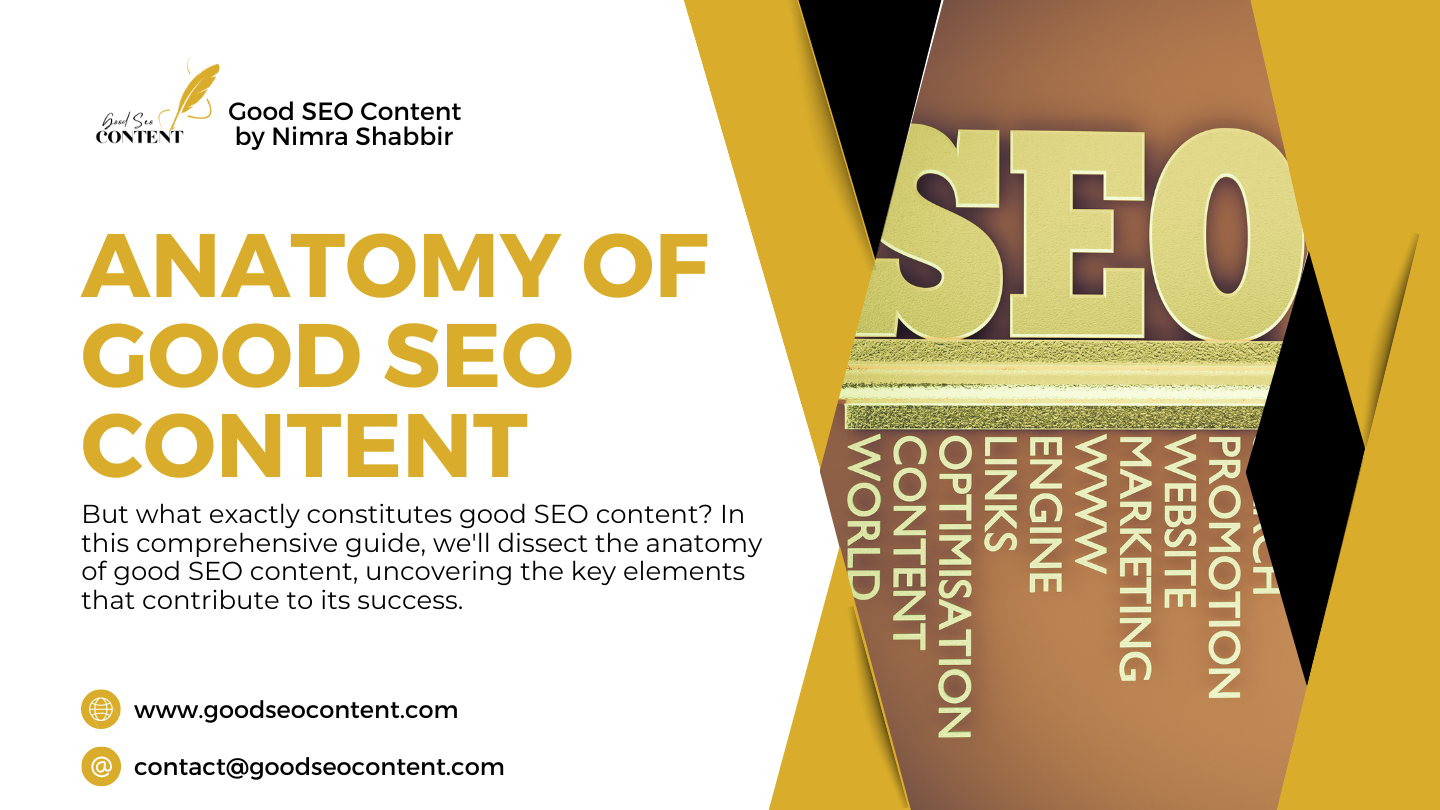In the ever-evolving landscape of digital marketing, one term that continues to reign supreme is SEO, or Search Engine Optimization. At the core of SEO lies content, the fuel that propels websites to the top of search engine results pages (SERPs). But what exactly constitutes good SEO content? In this comprehensive guide, we’ll dissect the anatomy of good SEO content, uncovering the key elements that contribute to its success.
Unlock the secrets of good SEO content with our comprehensive guide. Drive organic traffic and elevate your digital presence with expert insights.
Understanding the Basics of Good SEO Content
Before delving into the specifics, let’s first establish a clear definition of SEO content. Simply put, SEO content is any content created with the primary goal of attracting organic search engine traffic. This content is strategically crafted to align with relevant keywords and phrases that users commonly search for on platforms like Google, Bing, and Yahoo.
Read: Why niche research is important in 2024
Keywords: The Foundation of Good SEO Content
Keywords form the bedrock of SEO content. These are the terms and phrases that users input into search engines when seeking information or solutions to their queries. Effective keyword research is paramount to identifying the most relevant and high-value keywords for your content. Tools like Google Keyword Planner, SEMrush, and Moz Keyword Explorer can assist in this process, helping you uncover keywords with high search volume and low competition.
On-Page Optimization: The Blueprint for Success
Once you’ve identified your target keywords, it’s crucial to optimize your content accordingly. On-page optimization involves strategically placing keywords throughout your content, including in the title, headings, meta tags, and body text. However, it’s essential to maintain a natural flow and avoid keyword stuffing, as this can have a detrimental effect on both user experience and search engine rankings.
Content Quality: King of the SEO Realm
While keywords are undeniably important, they’re just one piece of the SEO puzzle. Equally critical is the quality of your content. Search engines prioritize content that is relevant, informative, and engaging to users. Aim to create content that addresses the needs and pain points of your target audience, providing valuable insights and solutions to their queries.
Read: Why niche research is important in 2024
User Experience: The Unsung Hero of SEO
In addition to content quality, user experience plays a significant role in SEO. Search engines take into account factors such as page loading speed, mobile-friendliness, and overall site usability when determining rankings. Optimize your website for speed and responsiveness, ensuring that users can easily navigate and consume your content across devices.
Link Building: Building Authority and Credibility
Link building is another essential component of SEO content. Inbound links from authoritative websites signal to search engines that your content is trustworthy and valuable. Focus on earning high-quality backlinks from reputable sources within your industry through guest blogging, influencer outreach, and content promotion.
Measuring Success: Tracking and Analytics
Finally, no SEO strategy is complete without robust tracking and analytics. Monitor key metrics such as organic traffic, keyword rankings, and conversion rates to assess the effectiveness of your SEO content efforts. Tools like Google Analytics and Google Search Console provide invaluable insights into user behavior and search performance, allowing you to refine and optimize your strategy over time.
Read: Why niche research is important in 2024
Conclusion: The Art and Science of SEO Content
In conclusion, good SEO content is a delicate balance of art and science. By understanding the fundamental principles outlined in this guide – from keyword research and on-page optimization to content quality and user experience – you can create compelling, search engine-friendly content that drives organic traffic and delivers tangible results for your business.
So, the next time you sit down to craft your next piece of content, remember the golden rule of SEO: prioritize the needs of your audience, and the search engine rankings will follow.
By incorporating these principles into your content creation strategy, you’ll be well-positioned to succeed in the competitive world of SEO and digital marketing.
Any content produced with the main objective of drawing natural search engine traffic is considered Good SEO content.
The basis of Good SEO content is keywords. When a user is looking for information, these are the words and phrases they enter into search engines. Selecting the most valuable and relevant keywords to increase traffic to your content is made easier with the aid of effective keyword research.
To find keywords that are perfect for your Good SEO content strategy and have a high search volume but little competition, try tools like Google Keyword Planner, SEMrush, and Moz Keyword Explorer.
Strategically inserting keywords into your content’s title, headings, meta tags, and body text is known as on-page SEO.


Website is good
You have mentioned very interesting points! ps decent website.Raise your business
Thanks!